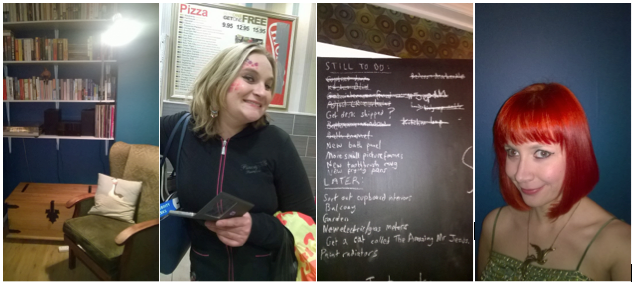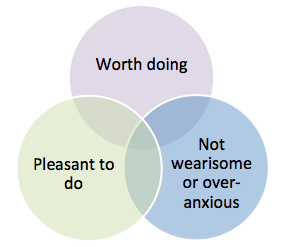So, I’ve been holding out on writing my usual inevitable new year blog post. Normally I can’t wait, and post it a few days after Christmas, overly eager for the new year and its attendant exciting air of, well, newness – as described in blogs passim, I’m usually all about the new. I have craved change my whole life, which has led to lots of exciting things and some rather pointless dicking around as I treated my life choices like some sort of eternal Pizza Hut buffet, sampling this and that until suddenly realising that it’s 6PM, all the staff are waiting for you to leave, and there is no more deep pan Hawaiian left which you now know was the only one you ever really wanted in the first pla- OK, may be getting a little too far into this simile. I just really like pizza. And change.
However, 2015 was what you might call an embarrassment of riches in that regard. Everything changed, then changed again. The boyfriend and I, after saving money for as long as I can remember, finally bought a flat together – but not before the one our first offer was accepted on just after Christmas 2014 was whipped off the table at the last minute, resulting in a process that had been plodding judiciously along for years suddenly becoming an urgent imperative to find somewhere, anywhere of roughly the right location, size and price like NOW. Which we did, with a bit of blood, sweat and tears (lots of that last one on my part).
We eventually took possession in June, and spent two months completely redecorating – a lot of work, yet more change, and a process which plunged me (and, by association, poor long-suffering boyfriend) into some pretty deep neuroses. It was whilst I was sitting on the floor of our new bedroom covered in paint and sobbing like a baby because we had run out of masking tape and what were we going to do that I worked out that just possibly there was more to my angst than our differences of opinion about home decor, and that I was in fact having a meltdown because the responsibility of co-owning a property was freaking me right the hell out, in a way I had entirely failed to anticipate during the whole slow burn build-up period. We got through it, largely due to his common sense, forbearance, and ability to provide endless cups of tea whilst listening to my insecure monologuing without reaching for a carving knife (thanks for all that, by the way xxx).
And now, the flat is finished (for the most part), we have been living here for nearly 6 months, and it is my happy place. There is really nowhere I would rather be. But giving birth to my grown-up, home-owning self was a surprisingly draining process, and would have been more than enough to be getting on with as far as I was concerned.
However, while all this has been going on, I have also begun two new jobs in quick succession, each exponentially more challenging and responsible than the previous one, and both in institutions where constant change is the status quo. During the same period, my best friend since schooldays undertook a complete, radical career-and-life change which included her leaving the country. Although obviously this is her change and not mine (and is, by the way, fantastic and wonderful and the best decision she has ever made – go Lucie!), it nonetheless made a huge difference to my life too, because of the huge part she plays in it. I miss her enormously, and her absence has made me suddenly, belatedly aware of how few really close relationships I have retained into adulthood, how small the circle is of people I feel I can turn to when I am happy, sad or scared and be absolutely confident they are going to be able to give me what I need in that moment. Which has actually been pretty good for me in some ways, as it means I’ve had to really think hard about what is and isn’t worth worrying about. If I let myself get upset about every little thing, then without the immediate catharsis of ranting to a sympathetic ally – guess what? I’m just going to stay upset. So I have to be selective; I have to learn to shrug the small stuff off all on my own. It’s been a ‘put-your-big-girl-pants-on’ kind of year in that respect as well.
So in every sphere – domestic, professional and personal – the winds of change have been a-howling through 2015 for me. And so forgive me if, when considering 2016, I sound a wee bit lacking in ambition. But what I’m really hoping for this year is for things to stay the same. For the foundations of my life as it is now, laboriously laid in the last year, to settle. When I really take the time to look at my life, I find that I am actually… content. And I want to get familiar with that feeling before the next whirlwind rides in, if that’s all the same to you, universe. So this year I’ve got no resolutions, no goals to smash within the next twelve months. I’m just going to live a little while. I’ve changed my hair; surely that’s enough for one year?

A year of change… My happy place; my best girl; a modest to-do list; new hair
Happy new year everybody. I hope you get all the changes (or not) that you are wishing for in 2016.
